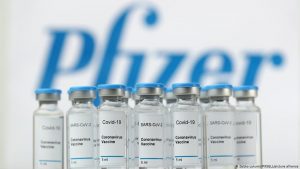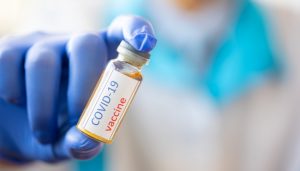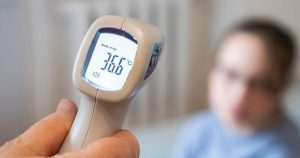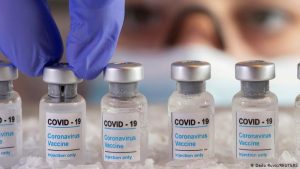
The pharmaceutical company Pfizer will soon provide documents for registration of a vaccine against coronavirus (COVID-19) disease in Ukraine, Deputy Minister of Health, Chief Sanitary Doctor of Ukraine Viktor Liashko said during a press briefing in Kyiv on Friday.
“Yesterday we had a telephone conversation with Pfizer headquarters. We were assured that all documents for vaccine registration in Ukraine will be submitted in the near future. The vaccine will be used only after registration,” he said.
Liashko recalled that vaccination in Ukraine would be free and voluntary.
“Vaccinations will be carried out by mobile teams, consisting of two nurses, a doctor, a registrar and a driver. They will provide organized professional teams [medical institutions, social institutions, and military units] with vaccinations at the first stage […] From February 5, we start medical trainings for doctors and regional coordinators to ensure logistical and coordination cooperation between the national, regional and vaccination rooms,” the deputy minister said.
At the same time, he said that the country had the necessary capacities for storing vaccines.
“We have capacities for storing vaccines with a temperature regime of minus 80 degrees Celsius and a temperature regime of plus 2 degrees Celsius. As for the latter, the state-owned enterprise Ukrvaktsyna can store about 30 million doses of vaccines. There are 25 warehouses at the regional level where it is possible to store the three-month need for vaccine. In addition, there are 490 district storage points and refrigeration equipment at vaccination points. We will closely monitor that the cold chain is observed,” Liashko said.
“At the same time, we have submitted an application to the European Investment Bank and we want to update all the refrigeration equipment in the vaccination rooms – even the one used for routine immunization,” he said.
Liashko said that citizens of Ukraine who are in the temporarily occupied territories of Donetsk and Luhansk regions and the Autonomous Republic of Crimea will also be provided with access to free and voluntary vaccination at vaccination points, which will be located in the territory controlled by Ukraine.

COVID-19 vaccines will begin to arrive in Ukraine under the COVAX mechanism in February this year, head of the EU Delegation to Ukraine Matti Maasikas said.
“We reacted quickly and provided EUR 190 million in aid and 1.2 billion in macro-financial support – an unprecedented amount for a crisis year. Today, the issue of vaccination against the virus has come to the fore. Vaccines under the EU-supported COVAX program will begin to arrive in February,” he said at a meeting of the Commission on coordination of implementation of the Association Agreement between Ukraine and the EU.
“Ukraine and other neighboring countries are a priority for the EU,” Maasikas said.
As reported, within the framework of the COVAX program, Ukraine will receive 117,000 doses of American-made Pfizer-BioNTech m-RNA vaccine in February, and in parallel, during the first half of 2021, from 2.2 to 3.7 million doses of AstraZeneca/Oxford vaccine.

Ukraine has registered 5,181 new cases of COVID-19, 11,310 recoveries, and 128 deaths in the past 24 hours, Ukrainian Health Minister Maksym Stepanov said.
“Ukraine recorded 5,181 new COVID-19 cases on January 29, 2021. In particular, the virus was contracted by 218 children and 212 medical workers. Over the past day, 1,916 persons have been hospitalized, 128 have died, and 11,310 have recovered,” Stepanov said on Facebook.
Since the beginning of the pandemic, 1,211,593 people have been diagnosed with COVID-19 in Ukraine; 22,479 of them have died and 1,003,341 have recovered to date.

Prime Minister Denys Shmyhal says that Ukraine is currently signing or has already signed contracts for more than 30 million doses of COVID-19 vaccines.
“There will be enough vaccines for everyone this year. Today, we have contracts for more than 30 million vaccines that have actually been signed and are being signed,” Shmyhal said on the air of ICTV channel on Monday evening, January 25.
The prime minister also said that all the queues according to the national vaccination plan will be observed, and the vaccination itself will start in February.
“In the near future, Ukraine will receive one million doses of vaccine. Until the end of January, we expect the amount of COVAX vaccine […] there will be the first delivery of COVAX vaccine in the amount of 200,000 doses or more, in order to start emergency immediate vaccination,” Shmyhal said.

The Synevo laboratory, part of the Swedish holding Medicover, has launched PCR tests that detect British and South African coronavirus (COVID-19) strains, including their currently known mutations.
According to Synevo’s press release, new PCR tests are carried out on new generation equipment and reagents from the U.S. company Abbott.
Investments in equipment for testing (two analyzers) amounted to more than EUR 200,000.
The tests detect the virus at the earliest stages of the disease, when the virus cells are still very little in the body, while other test systems will still give false negative results, although the person is already sick.
According to Synevo Development Director Mykola Butenko, new PCR tests allow detecting British and South African COVID-19 strains with the same accuracy as the previous COVID-19 strains.
In addition, new PCR tests, in addition to detecting COVID-19, can determine the viral load of SARS-CoV-2 on the body and the likely stage of the disease.
“We have received official confirmation from the head office of Abbott in the United States that new PCR tests detect two new strains of coronavirus: British and South African. These results were obtained by Abbott in clinical trials, and the reagents have already received international FDA accreditation,” Butenko said in a press release.
Synevo said that Abbott’s PCR tests are one of the most reliable in the world, their sensitivity is only 100 copies per 1 ml of biomaterial, while the sensitivity of other PCR tests for COVID-19 available on the Ukrainian market, from 400 copies and higher. This sensitivity allows almost completely eliminate false negative results.
Synevo is Ukraine’s largest network of medical laboratories, a division of the Swedish medical holding Medicover. The Synevo network consists of more than 300 laboratory centers operating in more than 115 cities throughout Ukraine, as well as seven laboratories in which more than 1,500 types of tests are performed.

Only 39% of Ukrainian citizens have expressed readiness to be vaccinated against the novel coronavirus if such a vaccine becomes available at local pharmacies, and 56% are not ready to do so, according to the results of a public opinion survey carried out by the Rating Sociological Group between January 14 and January 16, 2021.
Forty-three percent of respondents said they will be ready to be vaccinated if it is free of charge, and 52% of those polled expressed the opposite opinion. The majority of those who oppose vaccination are people from the age group between 30 and 49, women, residents of small towns, and those who are not afraid of contracting the disease, the poll findings show.
By comparison, 55% of Ukrainians supported free vaccination in November 2020. Meanwhile, the number of those who are ready to pay for the vaccine has slightly grown.
Fifty-one percent of respondents backed the strengthening of quarantine measures, including the lockdown, from January 8 to January 24, down from 56% in December, and 46% of those polled disapproved of the aforementioned steps.
At the same time, 40% of respondents believe that the lockdown will help curb the spread of the disease (52% in December), and 55% took the opposite view. One-third of those who support the lockdown said they do not consider it to be effective.
Sixteen percent of respondents said they had had COVID-19 or were suffering from it at the moment, 80% of those polled said they had not had COVID-19, and 4% could not answer the question.
As compared with previous such surveys, the latest poll shows that the respondents were considerably less worried by the fact that they themselves or their relatives might contract the virus. This figure stands at 40% in January, down from 57% in November. Seventy-eight percent of respondents to the latest survey expressed concern that their relatives and friends might contract the disease, as compared to 87% in November. The respondents who expressed the greatest concern on this matter were the elderly and women.
The poll, using the Computer-Assisted Telephone Interview method, took place between January 14 and January 16 and surveyed 1,600 respondents aged 18 and up.